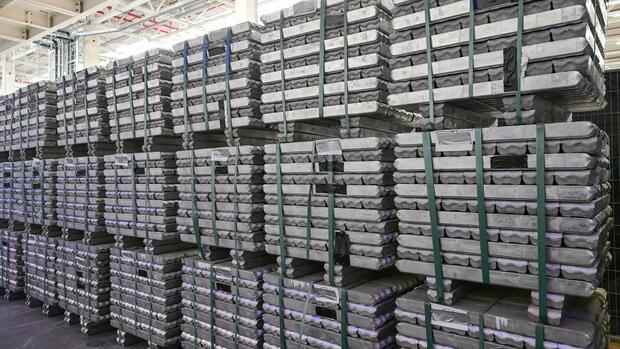Ores, metals and semi-finished metals also rose sharply by 55.8 percent.
(Photo: dpa)
Berlin German wholesalers raised their prices at record speed in March after the Russian invasion of Ukraine. They rose by an average of 22.6 percent compared to the same month last year, as the Federal Statistical Office announced on Tuesday. There has not been a greater increase since the calculations began in 1962.
In February it was still 16.6 percent. Disrupted supply chains, such as those caused by corona outbreaks in China, also make many goods more expensive. From February to March alone, wholesale prices therefore rose by 6.9 percent – that too is a record increase.
The development is considered an indicator of future inflationary tendencies, since wholesalers are the link between manufacturers and end customers, and higher costs usually end up with consumers.
The high increase is due to sharply increased prices for many raw materials and preliminary products. “Since the survey was carried out on March 5, 2022, the results should already reflect the first consequences of the Russian attack on Ukraine,” according to the statisticians.
Top jobs of the day
Find the best jobs now and
be notified by email.
- Wholesale petroleum products cost 70.2 percent more than in March 2021.
- Solid fuels recorded an increase of 61.9 percent.
- Ores, metals and semi-finished metals also rose sharply by 55.8 percent.
- Wholesale prices for grain, raw tobacco, seeds and animal feed were also significantly higher (+43 percent).
- Raw and sawn timber prices increased by 42.5 percent.
- Trade in chemical products recorded an increase of 40.1 percent.
- 22.6 percent more had to be paid for milk, milk products, eggs, cooking oils and dietary fats.
The wholesale association BGA fears that prices will continue to rise because the warehouses could be empty and in some cases the supplies no longer work after the Russian attack on Ukraine.
In addition to the strong dependence in the energy sector, aluminum producers and the food trade could be affected. Pulp could also become scarce, such as toilet paper and kitchen rolls.
According to the BGA, shortages do not automatically lead to empty shelves. However, products can often only be sourced elsewhere than from Ukraine or Russia at higher prices and with longer delivery times.
More: ECB minutes – currency watchdogs fear stagflation
